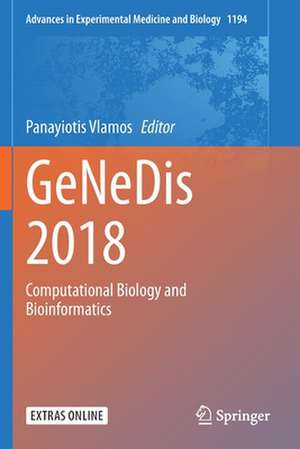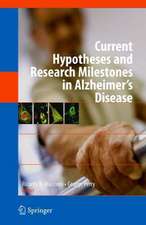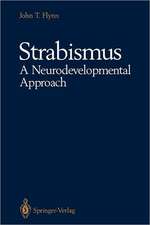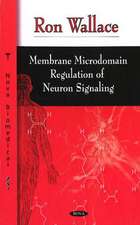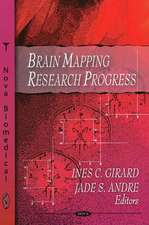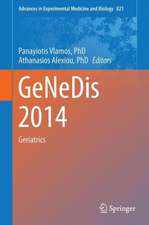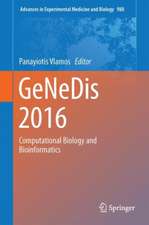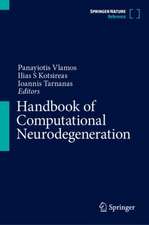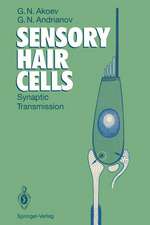GeNeDis 2018: Computational Biology and Bioinformatics: Advances in Experimental Medicine and Biology, cartea 1194
Editat de Panayiotis Vlamosen Limba Engleză Paperback – 16 iul 2021
| Toate formatele și edițiile | Preț | Express |
|---|---|---|
| Paperback (3) | 933.12 lei 6-8 săpt. | |
| Springer International Publishing – 26 aug 2021 | 933.12 lei 6-8 săpt. | |
| Springer International Publishing – 26 aug 2021 | 1210.63 lei 6-8 săpt. | |
| Springer International Publishing – 16 iul 2021 | 1422.31 lei 6-8 săpt. | |
| Hardback (3) | 944.36 lei 6-8 săpt. | |
| Springer International Publishing – 29 mai 2020 | 944.36 lei 6-8 săpt. | |
| Springer International Publishing – 29 mai 2020 | 1222.01 lei 6-8 săpt. | |
| Springer International Publishing – 29 mai 2020 | 1429.44 lei 6-8 săpt. |
Din seria Advances in Experimental Medicine and Biology
- 9%
 Preț: 719.60 lei
Preț: 719.60 lei - 20%
 Preț: 691.93 lei
Preț: 691.93 lei - 5%
 Preț: 717.00 lei
Preț: 717.00 lei - 5%
 Preț: 716.28 lei
Preț: 716.28 lei - 5%
 Preț: 717.20 lei
Preț: 717.20 lei - 15%
 Preț: 640.24 lei
Preț: 640.24 lei - 5%
 Preț: 1113.83 lei
Preț: 1113.83 lei - 5%
 Preț: 715.71 lei
Preț: 715.71 lei - 5%
 Preț: 820.43 lei
Preț: 820.43 lei - 15%
 Preț: 641.38 lei
Preț: 641.38 lei - 5%
 Preț: 716.28 lei
Preț: 716.28 lei - 5%
 Preț: 523.99 lei
Preț: 523.99 lei - 5%
 Preț: 1031.00 lei
Preț: 1031.00 lei - 5%
 Preț: 717.00 lei
Preț: 717.00 lei - 5%
 Preț: 715.35 lei
Preț: 715.35 lei - 20%
 Preț: 1161.71 lei
Preț: 1161.71 lei - 5%
 Preț: 1170.51 lei
Preț: 1170.51 lei - 18%
 Preț: 1119.87 lei
Preț: 1119.87 lei - 5%
 Preț: 1288.48 lei
Preț: 1288.48 lei - 5%
 Preț: 1164.67 lei
Preț: 1164.67 lei - 5%
 Preț: 1101.73 lei
Preț: 1101.73 lei - 18%
 Preț: 1123.67 lei
Preț: 1123.67 lei - 5%
 Preț: 1435.64 lei
Preț: 1435.64 lei - 20%
 Preț: 1044.10 lei
Preț: 1044.10 lei - 18%
 Preț: 946.39 lei
Preț: 946.39 lei - 5%
 Preț: 292.57 lei
Preț: 292.57 lei - 18%
 Preț: 957.62 lei
Preț: 957.62 lei - 18%
 Preț: 1235.76 lei
Preț: 1235.76 lei - 5%
 Preț: 1231.55 lei
Preț: 1231.55 lei - 5%
 Preț: 1292.30 lei
Preț: 1292.30 lei - 5%
 Preț: 1102.10 lei
Preț: 1102.10 lei - 18%
 Preț: 1132.81 lei
Preț: 1132.81 lei - 5%
 Preț: 1165.19 lei
Preț: 1165.19 lei - 5%
 Preț: 1418.48 lei
Preț: 1418.48 lei - 5%
 Preț: 1305.63 lei
Preț: 1305.63 lei - 18%
 Preț: 1417.72 lei
Preț: 1417.72 lei - 18%
 Preț: 1412.99 lei
Preț: 1412.99 lei - 24%
 Preț: 806.16 lei
Preț: 806.16 lei - 18%
 Preț: 1243.29 lei
Preț: 1243.29 lei - 5%
 Preț: 1429.44 lei
Preț: 1429.44 lei - 5%
 Preț: 1618.70 lei
Preț: 1618.70 lei - 5%
 Preț: 1305.12 lei
Preț: 1305.12 lei - 18%
 Preț: 1124.92 lei
Preț: 1124.92 lei - 5%
 Preț: 1097.54 lei
Preț: 1097.54 lei - 15%
 Preț: 649.87 lei
Preț: 649.87 lei - 5%
 Preț: 1097.54 lei
Preț: 1097.54 lei - 18%
 Preț: 945.79 lei
Preț: 945.79 lei - 5%
 Preț: 1123.16 lei
Preț: 1123.16 lei
Preț: 1422.31 lei
Preț vechi: 1497.16 lei
-5% Nou
Puncte Express: 2133
Preț estimativ în valută:
272.24€ • 295.82$ • 228.83£
272.24€ • 295.82$ • 228.83£
Carte tipărită la comandă
Livrare economică 22 aprilie-06 mai
Preluare comenzi: 021 569.72.76
Specificații
ISBN-13: 9783030326241
ISBN-10: 3030326241
Ilustrații: XIII, 508 p. 129 illus., 100 illus. in color.
Dimensiuni: 155 x 235 mm
Greutate: 0.73 kg
Ediția:1st ed. 2020
Editura: Springer International Publishing
Colecția Springer
Seria Advances in Experimental Medicine and Biology
Locul publicării:Cham, Switzerland
ISBN-10: 3030326241
Ilustrații: XIII, 508 p. 129 illus., 100 illus. in color.
Dimensiuni: 155 x 235 mm
Greutate: 0.73 kg
Ediția:1st ed. 2020
Editura: Springer International Publishing
Colecția Springer
Seria Advances in Experimental Medicine and Biology
Locul publicării:Cham, Switzerland
Cuprins
S-MEDUTA: Combining Balanced Scorecard with simulation and MCDA techniques for the evaluation of the strategic performance of an Emergency Department.- An Architecture For Cooperative Mobile Health Applications.- An Educational Scenario for the Learning of the Conic Section: Studying the Ellipse with the Use of Digital Tools and Elements of Differentiated Instruction and Cognitive Neurosciences 45.- Antibody clustering using a machine learning pipeline that fuses genetic, structural and physicochemical properties.- Neuroeducation and computer programming. A review.- Towards Analyzing Next Generation Sequencing Algorithms.- WOL Ecosystem: Secure remote power-state control of computer(s) over the internet for telemedicine purposes and dementia patients.- Epidemics Fuzzy Decision-Making Applications and Fuzzy Genetic Algorithms Efficiency Enhancement.- Multivariate data analysis and machine learning for prediction of MCI-to-AD conversion.- A Deep Learning Approach for Human Action Recognition using Skeletal Information.- Artificial Neural Networks in Computer Aided Drug Design. An overview of recent advances.- Computation of dolphins’ sound aspl while foraging.- Novel cost function definition for minimum-cost Tractography in MR Diffusion Tensor Imaging.- Platform for managing medical data by using a passive electronic device.- Evaluation of a computerized cognitive screening tool (ADPS, Altoida) in a sample of community-dwelling older adults.- Interconnections and Modeling Schemes of Kinesia Paradoxa.- Knowledge Discovery on IoT-enabled mHealth Applications.- Computational approaches applied in the field of neuroscience.- Drugena: A fully automated immunoinformatics platform for the design of antibody drug conjugates against neurodegenerative diseases.- Brain-Computer Interface Design and Neurofeedback Training in the case of ADHD Rehabilitation.- Particular biomolecularprocesses as computing paradigms.- Decision trees and applications.- Utilization of new technologies in the production of pharmaceutical olive oil.- A survey of evolutionary games in biology.- DTCo: An ensemble SSL algorithm for X-rays classification.- Cognitive Enhancement and Brain-Computer Interfaces. Potential Boundaries and Risks.- Informatics and cognitive assessment: a RUDAS scale paradigm.- Effective stochastic algorithm in disease prediction.- A Systems Biology Approach for the Identification of Active Molecular Pathways during the Progression of Alzheimer’s Disease.- A brief survey of the Prisoners' Dilemma game and its potential use in biology.- Validation of modeling and simulation methods in computational biology.- An improved self-labeled algorithm for cancer prediction.- eHealth application for e-bloodanalysis, e-diagnosis and digital diet guidance.- Modeling the critical activation of chaperone machineryin protein folding.- ANTISOMA: A computational pipeline for the reduction of the aggregation propensity of monoclonal antibodies.- A microscale mathematical blood flow model for understanding cardiovascular diseases.- Blockchain For Mobile Health Applications Acceleration With GPU Computing.- Finite Size Effects in Networks of Coupled Neurons.- Detecting common pathways and key molecules of Neurodegenerative Diseases from the topology of molecular networks.- Robotic Systems involved in the diagnosis of Neurodegenerative diseases.- Undergraduate Students’ Brain Activity in Visual and Textual Programming.- Fuzzy logic Systems and Medical Applications.- Apache Spark Implementations for String Patterns in DNA Sequences.- Big Data Analysis and Genetic Liability to Neuropsychiatric Disease.- Mathematical models and computer simulation of chemical carninogenesis process and its inhibition by antocarcinogenic substances.- Transitioning knowledge levels through problem-solving methods.- Cellular phone user’s age or the duration of calls moderate autonomic nervous system? A meta-analysis.- Logical Analysis and Validation of Publications in Bioinformatics.
Notă biografică
Panayiotis Vlamos is a Greek mathematician who studies mathematics, bioinformatics and neurodegeneration. He is Professor of Mathematics and Head of the Department of Informatics, Ionian University. He is also heading the Bioinformatics and Human Electrophysiology Laboratory (BiHELab).
Textul de pe ultima copertă
The 3rd World Congress on Genetics, Geriatrics, and Neurodegenerative Disease Research (GeNeDis 2018), focuses on recent advances in genetics, geriatrics, and neurodegeneration, ranging from basic science to clinical and pharmaceutical developments. It also provides an international forum for the latest scientific discoveries, medical practices, and care initiatives. Advanced information technologies are discussed, including the basic research, implementation of medico-social policies, and the European and global issues in the funding of long-term care for elderly people.
Caracteristici
Proceedings of the 3rd World Congress on Genetics, Geriatrics and Neurodegenerative Disease Research Latest research on healthy aging and mental wellness This volume focuses on computational biology and bioinformatics
